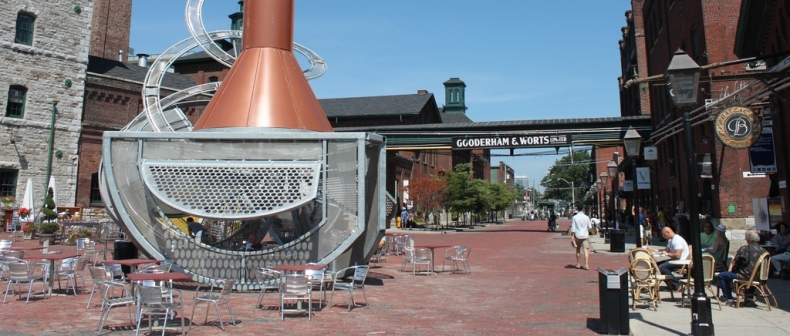
It’s hard to remember how the Distillery District felt before the cafes and galleries moved in. The old Gooderham and Worts Distillery, built on Mill Street just east of Parliament in 1859, was once a giant in the Toronto manufacturing scene. But its 19th century glory days gave way to an abandoned Victorian sandbox by the 1990s – and it was only in 2003, when it was re-opened to the public, that all of a sudden everything changed. Since that transformation, we know the Distillery today as Toronto’s mecca for weird pricey art, date restaurants, and the occasional smug person on a Segway.
Nobody really hates the Distillery. It’s true, there’s not much you can do there if you’re on a budget – but you can still try and snag some rush tickets at the theatre, and maybe buy a really good sandwich. It’s surprising how easily the glitzy Distillery bubble can make you forget you’re in the largest and best-preserved collection of industrial Victorian architecture on the continent. Amid the clinking glasses at brewery pubs and Swedish-designed kitchenware shops, you forget the ghost stories of the people who once worked here, making whisky and spirits.
It’s kind of poignant that alcohol – once the raison d’être of the Distillery – is so biologically tied up with forgetting. When we think of alcohol, we can imagine frosty nights by the fire with Disney-sized pint glasses – but then there are also the extremes. Nights where you blacked out, conversations you can’t remember, mornings where you can’t recall how you got home. Alcohol has a weird hold on our memories, and it’s something most of us have experienced but don’t necessarily think about.
The science that studies our brains on booze sees blackouts as a form of “alcohol-related amnesia.” When we consume large (but not necessarily obscene) amounts of alcohol, we stop storing long-term memories. That is, you’re still able to function in the moment, doing everything from having conversations, to initiating intercourse, to getting home. But it’s once those events are over that you’re unable to remember they even happened in the first place. That’s because while your long-term memory isn’t storing anything, your short-term memory remains relatively intact, allowing you to keep on truckin’ in your drunken state. Scientists call this symptom anterograde amnesia – in other words, the inability to record and store new memories.
If you’ve seen the movie Memento, it’s a little bit like that. While the film’s portrayal of amnesia is not totally accurate from a scientist’s perspective, it still gives you an idea of what the world is like when you can’t store long-term memories, living instead from moment to moment with no real recollection of what happened even a few minutes ago.
But the real question is, how does it all happen? How does alcohol make its way into our brains to keep our lived experience from being recorded? Anyone who’s browsed Wikipedia during a hangover will have figured out that ethanol acts as a depressant on the entire central nervous system (that’s why you get sleepy and slow when you’ve had a lot to drink). But apart from being a system-wide depressant, it affects some regions of the brain more than others.
Alcohol acts particularly on the hippocampus (an area of the brain shaped a kind of like a seahorse) which is critical for learning and memory. Specifically, the hippocampus is where lived experiences are thought to be molecularly translated into long-term memories (a process called long-term potentiation). Alcohol specifically disrupts the function of two important neurotransmitters in the hippocampus, GABA and NMDA, which are involved in long-term potentiation. Once those functions are disrupted, your brain no longer has the necessary ingredients for making memories that will last more than a few minutes.
One common misconception is that blackouts only occur in alcoholics. Recently, an increasing number of studies have looked at blackouts among social drinkers, and often university students, who often don’t fit the stereotype of the middle-aged male alcoholic. Risk factors of alcohol-related memory loss included drinking too quickly and on an empty stomach, since sharp increases in blood alcohol levels seem to be a good predictor of amnesia. All of a sudden that kegger you don’t really remember is starting to make sense, isn’t it?
“Alcohol-related amnesia is a good reason for moderation with the bottle (in case you needed more reasons), or at least for having ample bread and cracker supplies on hand to fill up your stomach. Maybe it’s a good thing the drinks don’t come cheap anymore at the Distillery. This way we’ll remember them more.
____
Erene Stergiopoulos writes about brains and neighbourhoods for Toronto Standard. Follow her on Twitter @fullerenes.
For more, follow us on Twitter at @TorontoStandard and subscribe to our newsletter.














